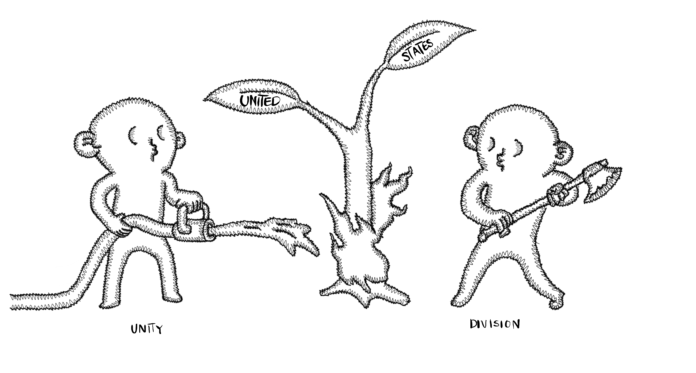On Nov. 8, the results of one of the most polarizing elections in recent history were finalized, and approximately half the country was left shell shocked.
For those glued to the polls on election night, the results became apparent state by state, and as the night wore on, it became evident that the United States would not be celebrating the inauguration of its first female president this January.
Disappointed in the democratic process and fearful of the rhetoric that characterized Donald Trump’s campaign, people across the nation, and even a few from around the globe, used the internet as a sounding board for their concerns. By 3 a.m., #NotMyPresident was trending on Twitter, followed closely by #ImStillWithHer, as people expressed their sadness over Clinton’s loss and their fear of and distain toward Trump. In the week following the election, protests against a Trump presidency have erupted across the nation and have even manifested on our own campus. Dialogue between the two parties has been sparse, tense and laced with accusations about why one party would vote for a businessman who seems to operate under racist ideologies and the other, a career politician who may have criminal actions in her past. But regardless of who you voted for or how you feel about the president-elect, the election is over, and we need to unify instead of allowing ourselves to be torn apart from the inside.
Movements such as #NotMyPresident are counterproductive. Trump has been named, definitively, the president-elect, and, as Clinton said in her concession speech on Nov. 9, “We owe him an open mind and a chance to lead.” #NotMyPresident, while an effective way to express your discontent, only perpetuates the hurt, anger and fear that has been so prevalent in this campaign cycle. It does nothing to help heal the nation, to bridge the rifts that have formed between voters and parties, to propose ways to move forward together.
Yes, your fears and misgivings about Trump are completely valid. His campaign was laced with racist, sexist and misogynistic remarks, and you might find it hard to respect a man who spent the last year showing us that he has little respect for others. Regardless, now more than ever, we need to band together as a community. This election has been polarizing — more so than previous elections. Our country is well and truly divided, and now we must begin the work of re-unifying. What’s done is done. Donald Trump is our president-elect, and our job now is to square our shoulders and figure out how to move forward, one step at a time, in a way that is as beneficial as possible for the most people.
Movement toward unity is going to manifest in various ways for different people. For some, it might be simply refraining from tagging your posts #NotMyPresident. As much as you don’t like it, if you are an American citizen, Trump will be your president. You can’t change that, so focus on improving what that means for America, for marginalized groups, for people both nationally and worldwide. For others, unifying might mean finding ways to respect those with different beliefs than you or learning how to separate respect and agreement.
It’s hard to specify exactly what this necessary move toward unity will look like, but it certainly doesn’t look like fleeing. On election night, Canada’s immigration website crashed — presumably because of an overload of people researching a way to avoid a Trump presidency. Americans: Looking for a backdoor to escape a Trump presidency is not an effective means of avoiding a candidate of whom you disprove. Running away is never the best answer. Instead, invest in your country and your fellow Americans, and try to find a way to mold this presidency into something beneficial.
Impulse-based reactions to the elections are not helpful, and they are not effective. You are allowed to be upset, and you are certainly allowed to take to the internet to voice your disapproval, fear and anxiety over what will come with the next four years, but take care with your rhetoric. We’ve seen how almost a year’s worth of careless words has caused nationwide division and strife — don’t make the same mistake with your own words. Movements such as #NotMyPresident only serve to deepen the division between parties in a time where we need to be focused on mending the divides currently splitting the nation.
Don’t let yourself become overwhelmed by what you cannot change. Instead, concentrate on what we need to accomplish to work together moving forward. Don’t become blind by fear. Concentrate only on the small steps we need to take tomorrow, and then the day after. Clinton said it best: “We have seen that our nation is more deeply divided than we thought. But I still believe in America, and I always will. And if you do, then we must accept this result and then look to the future.”






